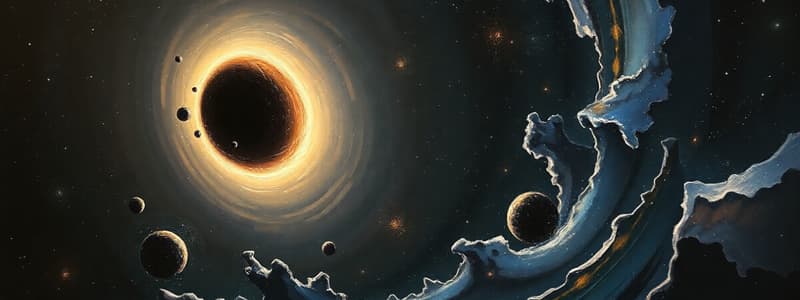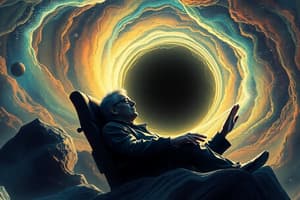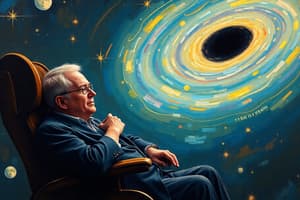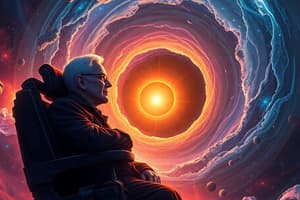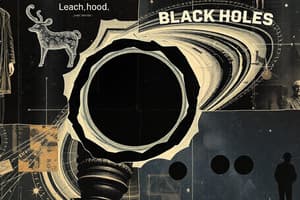Podcast
Questions and Answers
What was the significance of the detection of "X-ray binaries" in 1964 in relation to black holes?
What was the significance of the detection of "X-ray binaries" in 1964 in relation to black holes?
- It provided direct visual confirmation of black holes at the center of galaxies.
- It confirmed that black holes are only found in star-forming regions.
- It offered evidence supporting the existence of black holes by identifying potential candidates in the Milky Way. (correct)
- It disproved the existence of black holes as the X-rays emitted were too weak.
How did Stephen Hawking's work with Roger Penrose contribute to the understanding of black holes?
How did Stephen Hawking's work with Roger Penrose contribute to the understanding of black holes?
- They proved that singularities can only occur in the context of black holes.
- They disproved Einstein's general theory of relativity using black hole observations.
- They mathematically proved that the collapse of a giant star could lead to a singularity, assuming Einstein's theory of relativity is correct. (correct)
- They demonstrated that black holes do not actually contain singularities.
What key theoretical idea did Stephen Hawking introduce in 1974, drawing on quantum theory, that revolutionized the understanding of black holes?
What key theoretical idea did Stephen Hawking introduce in 1974, drawing on quantum theory, that revolutionized the understanding of black holes?
- Black holes emit radiation, lose energy, and eventually evaporate over time. (correct)
- Black holes are cosmic vacuum cleaners, sucking in all matter and energy without release.
- Black holes are stable and unchanging entities that neither gain nor lose mass.
- Black holes reflect all light and radiation, making them impossible to detect directly.
What was the primary goal of Stephen Hawking in writing "A Brief History of Time?"
What was the primary goal of Stephen Hawking in writing "A Brief History of Time?"
What was the significance of Stephen Hawking's PhD thesis, written in 1966?
What was the significance of Stephen Hawking's PhD thesis, written in 1966?
How did Stephen Hawking continue to contribute to physics after losing his voice in 1985?
How did Stephen Hawking continue to contribute to physics after losing his voice in 1985?
What crucial element did Hawking integrate into his theories about black holes that was not part of the initial understanding of these phenomena?
What crucial element did Hawking integrate into his theories about black holes that was not part of the initial understanding of these phenomena?
What role did Karl Schwarzschild play in the development of black hole theory before the term "black hole" was even coined?
What role did Karl Schwarzschild play in the development of black hole theory before the term "black hole" was even coined?
How did Hawking apply quantum mechanics to refine his black hole theories?
How did Hawking apply quantum mechanics to refine his black hole theories?
What is the significance of Hawking radiation in the context of black holes?
What is the significance of Hawking radiation in the context of black holes?
What was Stephen Hawking's view on the beginning of the Universe?
What was Stephen Hawking's view on the beginning of the Universe?
How did Roger Penrose contribute to the understanding of black holes and the Big Bang theory?
How did Roger Penrose contribute to the understanding of black holes and the Big Bang theory?
In what way did the collaboration between Roger Penrose and Stephen Hawking advance the study of black holes?
In what way did the collaboration between Roger Penrose and Stephen Hawking advance the study of black holes?
How does Hawking radiation connect Einstein's theory of general relativity with quantum mechanics?
How does Hawking radiation connect Einstein's theory of general relativity with quantum mechanics?
What is the process of black hole evaporation, according to Hawking's theories?
What is the process of black hole evaporation, according to Hawking's theories?
How did Hawking's peers initially react to his formula for Hawking radiation?
How did Hawking's peers initially react to his formula for Hawking radiation?
How does Penrose's twistor theory contribute to quantum theory?
How does Penrose's twistor theory contribute to quantum theory?
What broader implication does Hawking's work have for modern physics?
What broader implication does Hawking's work have for modern physics?
Flashcards
Stephen Hawking
Stephen Hawking
Theoretical physicist who explored black holes and the origin of the Universe.
ALS
ALS
Incurable motor neurone disease diagnosed in Hawking, leading to gradual paralysis.
Black Hole
Black Hole
Region in space-time with gravity so strong that nothing, not even light, can escape.
Karl Schwarzschild
Karl Schwarzschild
Signup and view all the flashcards
X-ray binaries
X-ray binaries
Signup and view all the flashcards
Singularity
Singularity
Signup and view all the flashcards
Expanding Universes Thesis
Expanding Universes Thesis
Signup and view all the flashcards
Black Hole Evaporation
Black Hole Evaporation
Signup and view all the flashcards
Hawking Radiation
Hawking Radiation
Signup and view all the flashcards
Roger Penrose
Roger Penrose
Signup and view all the flashcards
Penrose Diagrams
Penrose Diagrams
Signup and view all the flashcards
Event Horizon
Event Horizon
Signup and view all the flashcards
A Brief History of Time
A Brief History of Time
Signup and view all the flashcards
Quantum mechanics
Quantum mechanics
Signup and view all the flashcards
The Big Bang Theory
The Big Bang Theory
Signup and view all the flashcards
Study Notes
- Stephen Hawking was a theoretical physicist who used mathematics to explore black holes and the origin of the Universe.
- He popularized science, enhancing the understanding of space-time, gravity, and humanity's place in the cosmos.
- Hawking was diagnosed with ALS in 1963 while studying astronomy at Cambridge University.
- ALS confined him to a wheelchair from 1969 and took away his voice in 1985.
- He communicated using a computer linked to a speech synthesizer controlled by his facial muscles.
Black Holes
- The term "black hole" was coined in 1967, although Karl Schwarzschild had hypothesized their existence in the 1910s.
- Matter pulled into a black hole creates X-rays.
- Astronomers detected "X-ray binaries" near star-forming regions in the Milky Way in 1964, suggesting a possible black hole.
Hawking's Theories
- Hawking studied the work of mathematician Roger Penrose.
- Penrose proved that the collapse of a giant star results in a singularity, which is an infinitely dense and small point in space-time if Einstein's theory of relativity is correct.
- Hawking suggested in his PhD thesis that the Universe could have started from a singularity, running the process in reverse.
- He compared the beginning of the Universe to the South Pole.
Hawking Radiation
- Hawking refined his black hole theories after a debate with Jacob Bekenstein in 1972, considering quantum mechanics.
- Quantum mechanics states that pairs of particles and antiparticles are constantly meeting and annihilating each other throughout the Universe.
- Hawking calculated that near the event horizon of a black hole, a negatively charged particle falls into the black hole.
- The positively charged half of the pair streams away as radiation, known as Hawking radiation.
- Hawking stated that black holes lose energy and mass through black hole evaporation.
- This is where negatively charged particles fall into it, eventually disappearing in a final explosion.
- In 1974, Hawking published his calculation showing how both the Universe began and how black holes evaporate.
- By combining general relativity and quantum mechanics, he created a vital clue in the search for a "theory of everything".
Recognition
- In 1979, Hawking became Cambridge’s Lucasian Professor of Mathematics.
- He wrote popular science books, including A Brief History of Time, which made him widely known.
- Hawking gave public lectures about his work.
Roger Penrose
- Roger Penrose is a British mathematician and theoretical physicist known for his work on black holes and the Big Bang theory.
- Penrose collaborated with Stephen Hawking to prove that black holes can arise from the gravitational collapse of massive stars.
- Penrose also developed twistor theory and a way of mapping the regions of space-time around a black hole using Penrose diagrams.
Studying That Suits You
Use AI to generate personalized quizzes and flashcards to suit your learning preferences.
